United Methodist Church is facing upheaval. These staff are helping prepare for the future
Thousands of churches exiting the United Methodist Church have strained budgets and placed greater political pressure on bishops who’ve increasingly taken on additional duties.
This instability has meant the work for a group of administrative staff, like accountant Sharah Dass, is proving more crucial than ever to the church's future.
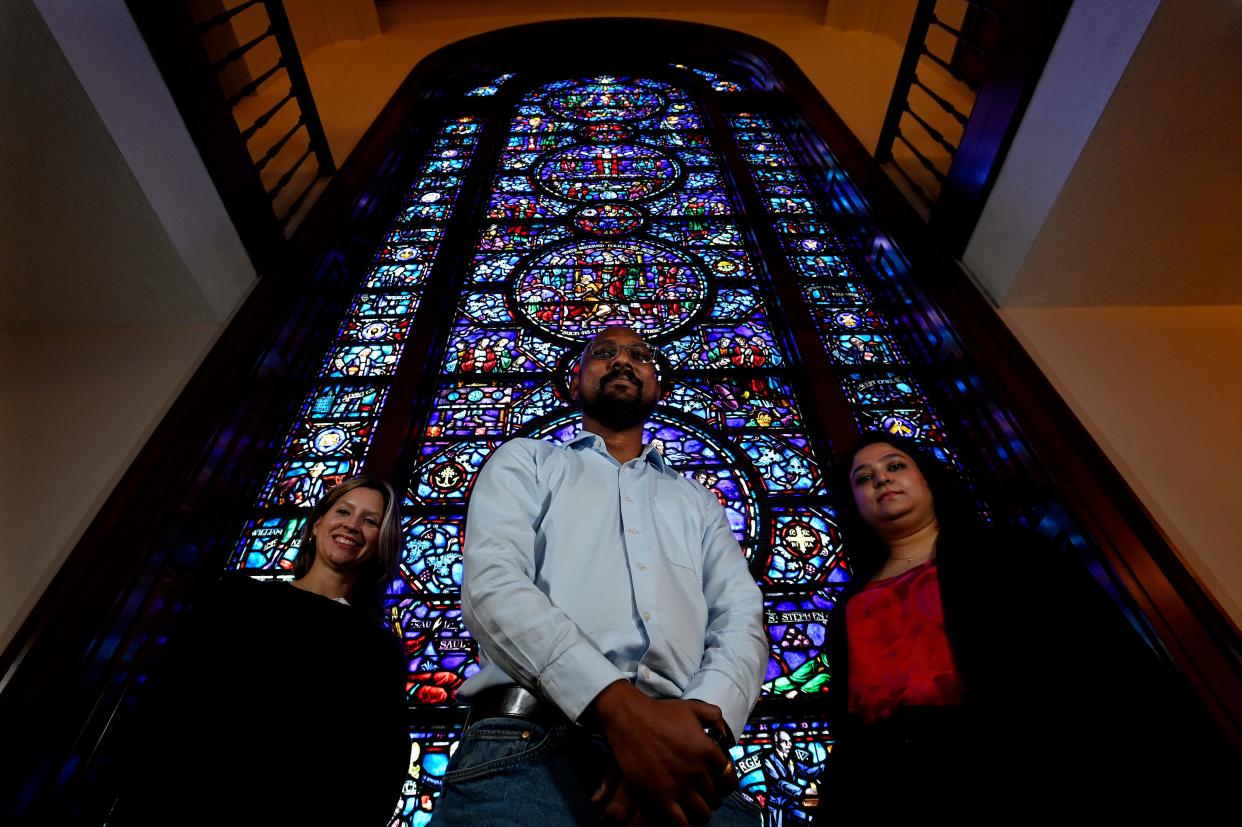
“I’m personally okay with change and flexibility,” said Dass, who manages finances for United Methodist bishops at the UMC General Council on Finance & Administration. “But also, if that’s what’s needed to support the church, then that’s what is needed.”
Citing her experiences as both an immigrant and beneficiary of United Methodist institutional support, Dass is helping manage the fallout of a splintering throughout the largely Nashville-based UMC. About a quarter of the denomination's churches left, or disaffiliated, from the United Methodist Church between 2019-2023 following disagreements over theology and church policy, including dealing with LGBTQ+ rights.
Originally emigrating to the U.S. from Pakistan for a Pulaski, Tennessee college, Dass later moved to Nashville to pursue a master’s degree at Vanderbilt University Divinity School. United Methodist organizations provided her scholarships to help cover tuition both times. After she started working for the Nashville-based GCFA, the agency sponsored her application for a H-1B work visa. It allowed her to build a life here and, more recently, start a family. The agency has continued to provide necessary stability as Dass learns to be a new mother, she said.
“This work is rewarding for me because in some small way, I can give back to the connection in the way that it gave me,” said Dass, referring to the network of United Methodist ministries and agencies. Lately, that work has entailed supporting bishops managing added responsibilities, such as one bishop overseeing multiple regional conferences — an early example of administrative consolidation, an increasingly common phenomenon throughout the UMC intended to reduce overhead costs.
The story of Dass and three of her colleagues, both in their personal and professional lives, is one of empowerment. Those four staff said they’ve sought to keep their composure amid the recent upheaval, no matter how drastic or rapid the administrative landscape shifted.
United Methodist clergy said that consistent, grounded attitude will be key as UMC general agencies’ step in to meet congregation’s needs left by a weakened regional infrastructure. But those agencies are also facing their own cuts, meaning they will need to think creatively about expanding and adequately funding key services.
“It’s a tragedy to have budget cuts at the same time when we need agencies’ ability to speak across cultures with both integrity and relevance,” said the Rev. Jeremy Smith, pastor of First United Methodist Church in Seattle and a popular blogger in the UMC.
The UMC General Conference will convene in Charlotte for two weeks starting April 22 to vote on a proposed budget reduction and other legislation expected to shape the long-term future of the nation's largest mainline Protestant denomination. The denomination’s top legislative assembly meets every four years, though it hasn’t gathered for a regular session in eight years due to the COVID-19 pandemic.
In a more recent example of the important role United Methodist agencies play, Smith said he used materials created by the General Commission on Religion and Race to guide discussions at his church on racial justice in the wake of protests following George Floyd’s murder.
“The weight of the worldwide issues has really fallen onto the local churches. Sometimes the conferences don’t have the bandwidth to focus on those things, but the agencies do,” Smith said. “We need that more than ever.”
Understanding the conflict: A pro-LGBTQ movement in the United Methodist Church eyes future after conservative exodus
Empowered to sustain and respond
Despite their prominence and service to United Methodists worldwide, the denomination’s general agencies have largely been absent from controversy about the denomination’s splintering.
“In the agency, we don’t really talk about what is happening on the political side,” said Sandeep Kuntam, a data analyst for the administrative agency. “What we do is: ‘How can we support?’”
A way Kuntam provides that support is through the custom financial reports he produces for regional conference staff.
Much of Kuntam’s work is part of a more entrepreneurial side of the General Council on Finance & Administration known as shared services, in which its staff essentially act as a third-party consultant for other general agencies, regional conferences, and churches. This shared services model saves money, and it also diversifies the agency's revenue.
The core source of funding for the finance administration and nine other United Methodist agencies are seven general funds, which comprise the denomination’s overall budget. Funding for those general funds originate from church giving.
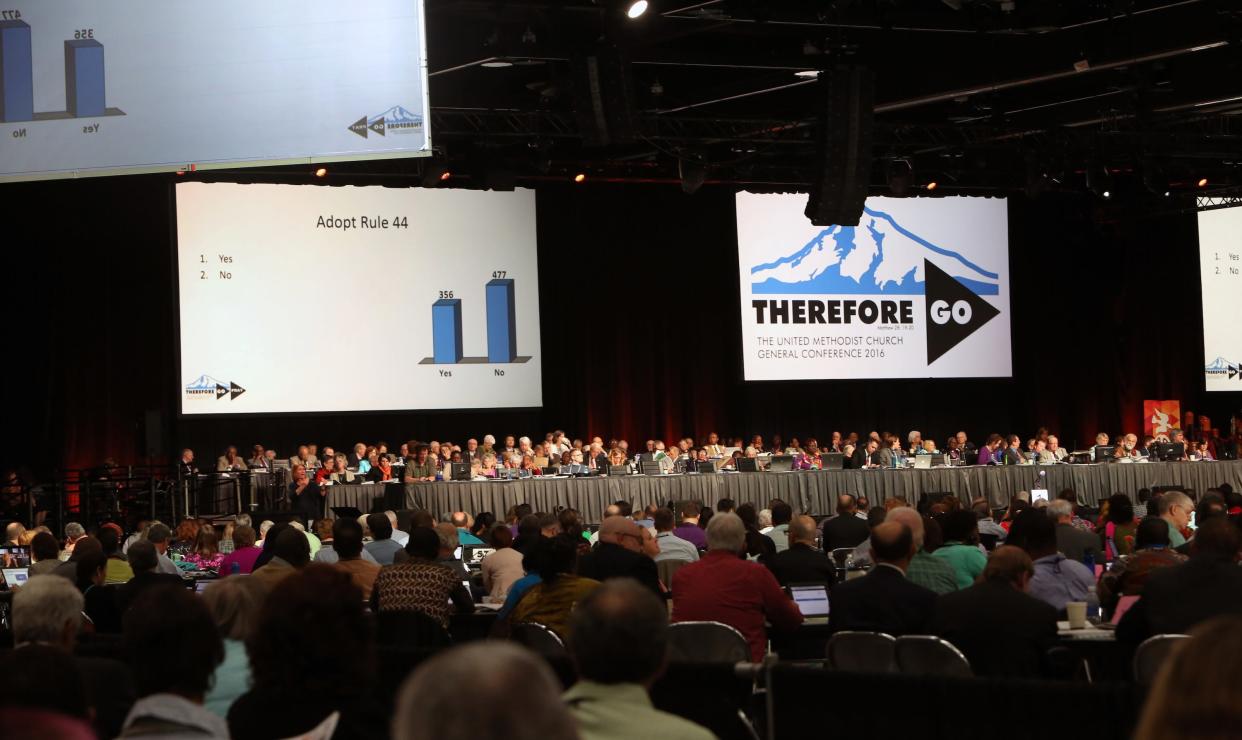
The funds go to the agency to fulfill assignments outlined in the UMC Book of Discipline. For the General Council on Finance & Administration, those assignments are managing the general administration fund and episcopal fund, which pays for bishops’ salaries.
A proposed budget at the upcoming UMC General Conference is recommending major cuts to most of those general agencies. The administrative agency is facing a 47% reduction, a significant hit after the agency that already eliminated about 20 staff positions in the past four years and sold its Nashville building. It now shares an office space with other Nashville-based United Methodist general agencies.
These budgetary constraints mean work like Kuntam’s will be even more important. But as Kuntam sees it, though the shared services enterprise relies on a different financial calculus, the work comes from the same mission.
“We’ll still be doing the same missions and ministry we’ve been doing,” Kuntam said. “Our responsibility at GCFA doesn’t change with changes at general conference.”
UMC General Conference preview: United Methodists are set to hold a historic worldwide meeting: The key issues to watch
Empowered to help bear burdens
The United Methodist finance agency has been largely immune to factional headwinds in the denomination, despite the fact that it’s part of the same bureaucracy at the center of fervent outcry, Smith said.
“It’s really easy to get people mad about the bishops and the agencies,” said Smith, a prominent progressive voice in the UMC and critic of proponents of disaffiliation. “I think that’s what fueled a lot of the discontent in the past few years.”
The GCFA specifically has found itself in the middle of protests against other United Methodist general agencies when dissenting churches withhold apportionments, or the term for the money that supports the denomination’s seven general funds. Smith has blogged about how early examples of this protest, such as one in led by five Tennessee churches in 1979, inspired a playbook for traditionalist advocacy, as recently as 2022.
Even when general agencies aren’t implicated in spats, the overall conflict has strained general agency staff, said the Rev. Adam Hamilton, pastor of United Methodist Church of the Resurrection in Leawood, Kansas and a leading centrist voice in the denomination.
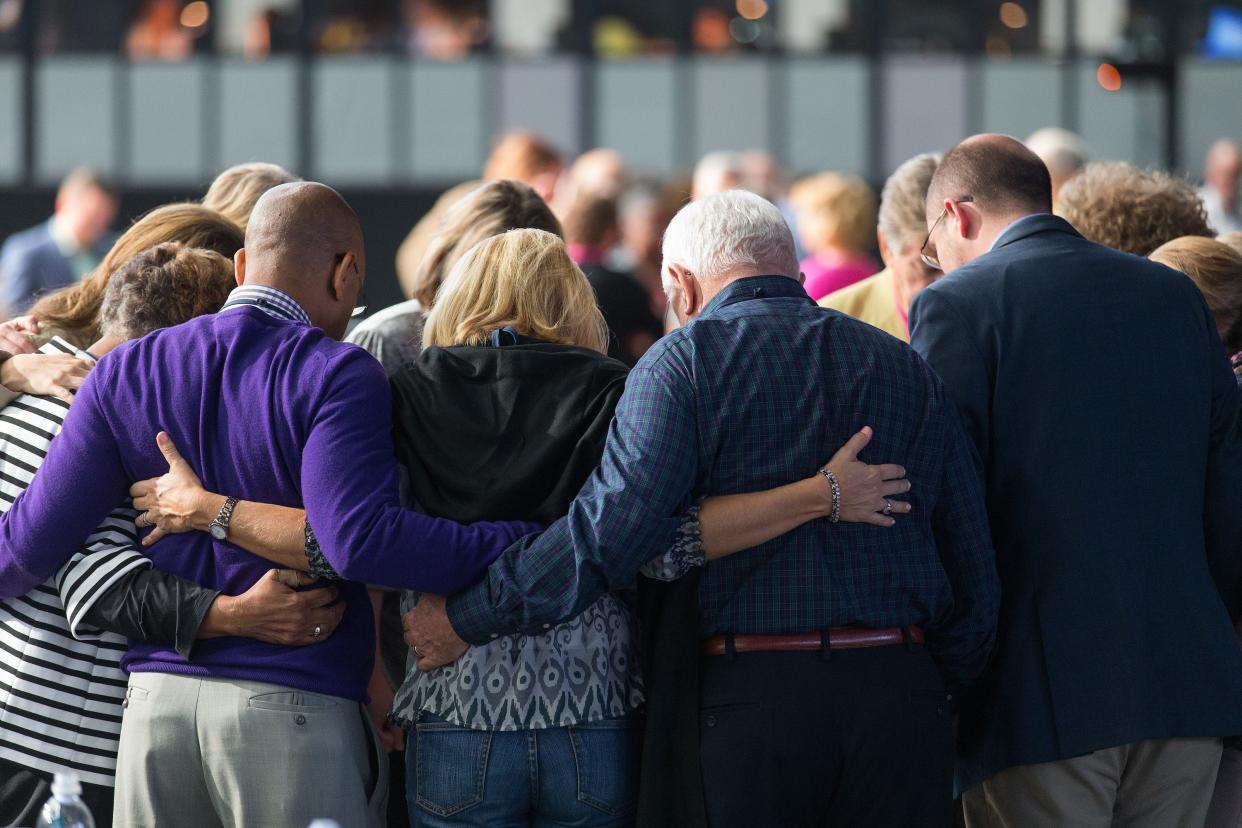
“In the midst of the divisiveness of the past few years … I know they (general agency staff) have carried the weight and stress around with them,” said Hamilton, who due to his high-profile became a de facto spokesperson for anti-disaffiliation advocates in the UMC. “But I think we’re going to come through this stronger and better than we have been in the past.”
That sort of resolve is embodied in Caitlin Congdon’s work with the General Council on Finance & Administration, especially lately in her capacity working with staff of other general agencies and regional conferences, which are called annual conferences.
“There have been some really tough conversations,” said Congdon, chief officer of HR and professional development. “But throughout all the conversations that may be difficult, there’s a sense of ‘How can we do right by all of the people that are being impacted?’”
In addition to her duties overseeing HR for the administrative agency, Congdon has also been a consultant through the agency's shared services enterprise. Congdon has developed that consulting since her hiring in 2016, initially by offering one-off services, such as guidance on recruitment, and has grown to now include the whole suite of HR needs.
More recently, she’s been advising clients about laying off staff and consolidating staff positions.
“I try to help with of how we can reprioritize the work,” Congdon said. “You can’t just downsize and leave all the goals and priorities the same.”
Congdon’s colleague, Ndzulo Tueche, is similarly helping regional United Methodist leaders navigate a moment of heightened anxiety, but for very different reasons.
As a connection relations manager for the United Methodist Church outside the U.S., Tueche works closely with regional leaders and churches in Africa, the Philippines, Korea and Europe. He has been fielding questions about prospective changes.
Churches outside the U.S. are barred from disaffiliating, though traditionalist proposals to the upcoming UMC General Conference aim to change that. The general conference will also take up proposal, called “regionalization,” that proponents see as an incentive for churches outside the U.S. churches to stay in the UMC by giving international regional authority more autonomy.
“The number of phone calls have increased because people have questions, doubts and fears,” said Tueche, who lives in Côte d’Ivoire in West Africa. “The work has changed a lot.”
Empowered for the inevitable and in the long run
When he isn’t answering questions about the fate of global United Methodism, Tueche is helping with more routine needs.
One example is transitioning church officials to use digital tools, such as Dropbox, instead of traditional mail to submit customary reports to the administrative agency.
“Some folks in their mindset still cling to the way we used to do things back then,” Tueche said. “What I try to simplify is: ‘We’re still doing the same thing. It’s just the approach that is different.’”
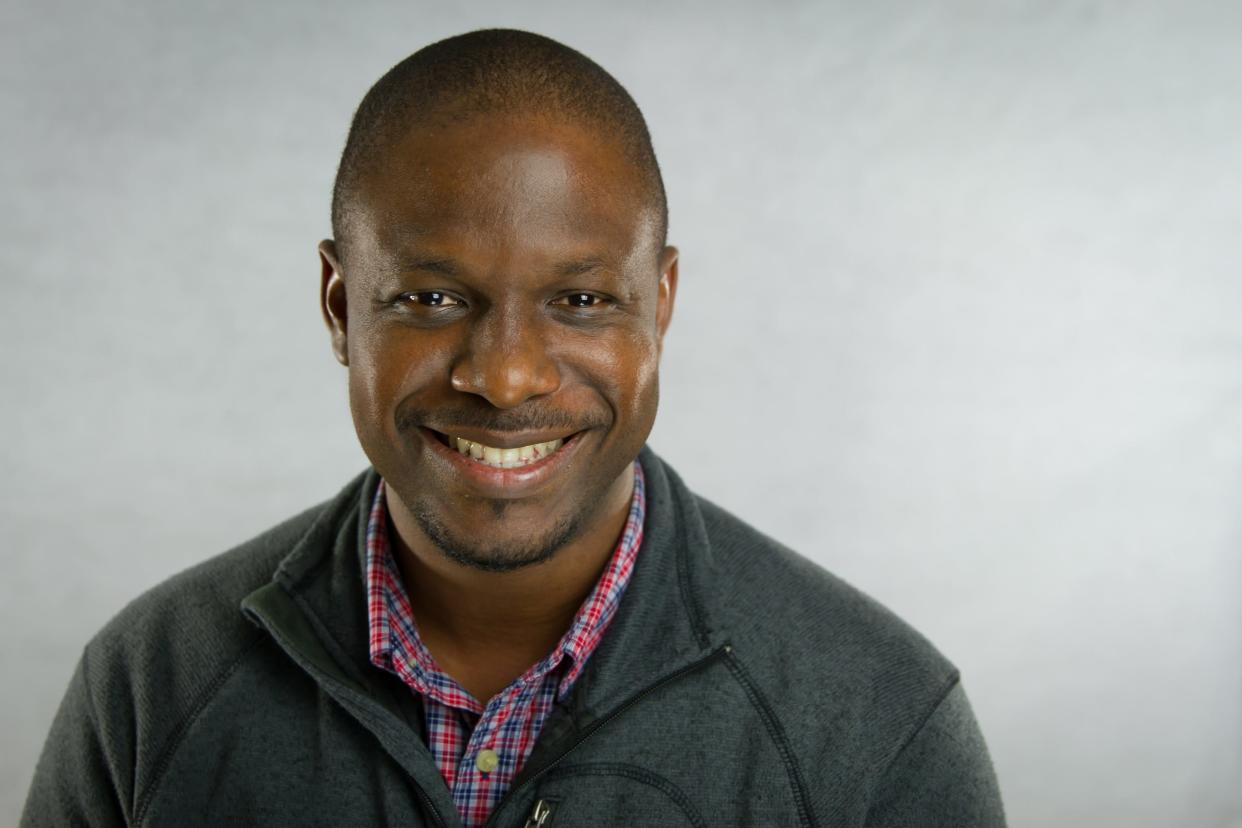
The same concept applies to the transition facing the whole denomination, not just certain regions.
“It’s something many of us have dreamt of for a long time in terms of working together and sharing services,” Hamilton said. The UMC General Conference in 2012 considered proposals to restructure and consolidate general agencies, partly in response to prospective budget shortfalls.
Despite consistently higher proposed budgets to the UMC General Conference, a growing trend of churches closing due to aging and shrinking congregations increased awareness of future revenue shortfalls.
Decline was inevitable, and the splintering only accelerated the aftershock.
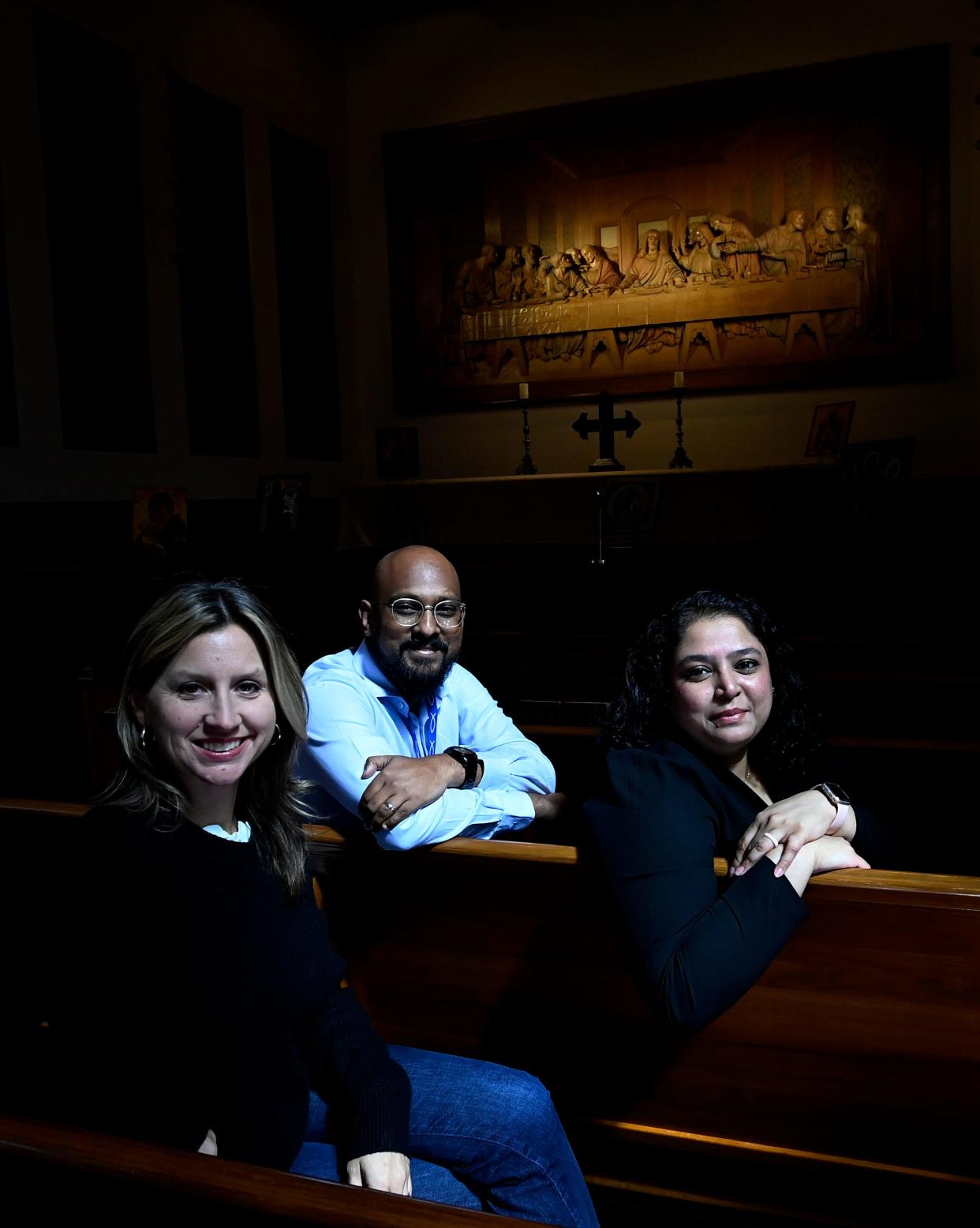
“The things that we hoped would happen in 2012 now have to happen as a result of the disaffiliations,” Hamilton said. “The general boards and agencies are going to have to think about how they do more with less.”
Though United Methodism’s administrative trajectory may change, its locomotion doesn’t.
Staff at the General Council on Finance & Administration find motivation in the same virtues today that they did eight years ago.
For Kuntam, that virtue is the hospitality he found at St. Mark’s United Methodist Church in Murfreesboro when Kuntam emigrated from India to the U.S. to pursue a master’s degree at Middle Tennessee State University.
“They adopted me and included me in everything,” Kuntam said. He still worships at St. Mark’s and is involved with its student ministry and finance council.
For Tueche, employment with United Methodist general agencies, first for United Methodist Communications and then for the General Council on Finance & Administration, allowed him to put down roots in Côte d’Ivoire, where he emigrated from Cameroon.
Dass expressed a similar gratitude for the doors the UMC helped open for her, saying her day job “is a very personal decision I make every day.” Dass considered at one point pursuing ordination in the United Methodist Church, which is what led her to enroll in Vanderbilt Divinity School after she received a bachelor’s degree in accounting. But that move instead led her to the GCFA and realize her greatest strength to serve the church was accounting, though it’s a vocation of less acclaim.
“As I’ve been thinking about it over the years, I think I can give more on this end,” Dass said. “My gifts are more for this side of the desk versus on an altar.”
Liam Adams covers religion for The Tennessean. Reach him at ladams@tennessean.com or on social media @liamsadams.
This article originally appeared on Nashville Tennessean: United Methodist Church upheaval adds pressure to clergy, admin staff
